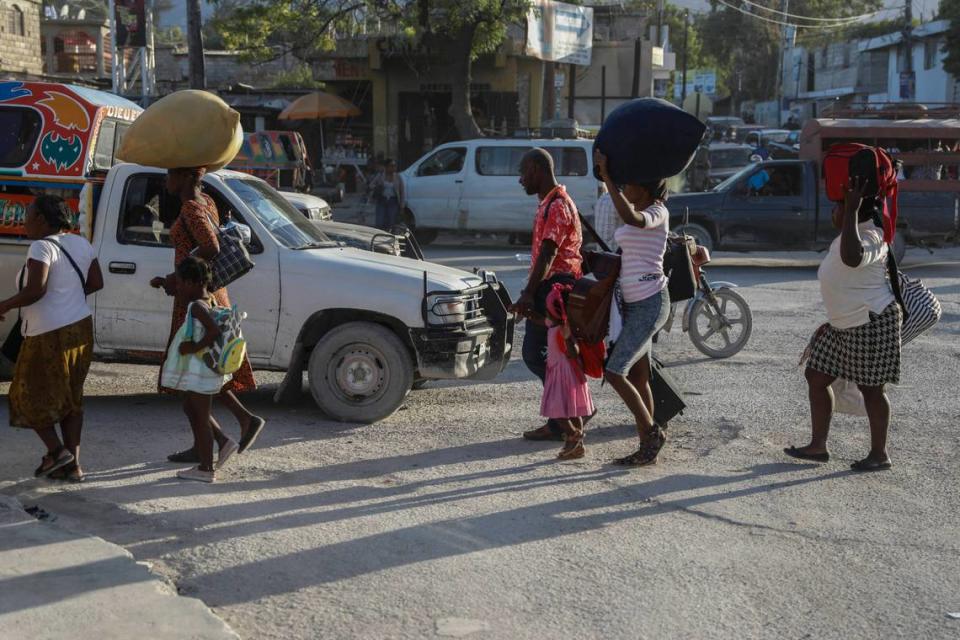Kenya parliament approves security mission to Haiti. Supreme court ruling still to come
Kenya’s National Assembly on Thursday approved the deployment of 1,000 police officers to Haiti, clearing a major hurdle in the internationally backed effort to help the volatile country take down violent gangs and restore democratic order with elections.
The vote by the East African nation’s parliament comes after the High Court in Nairobi in October blocked the United Nations’ supported deployment after a former presidential candidate challenged its constitutionality and as Haiti experiences a fresh-round of gang related violence and kidnappings. Inter-gang warfare in the capital of Port-au-Prince ignited again this week after the death of a major gang leader when his gun accidentally went off, leading to an attack against a hospital Wednesday in Haiti’s largest slum, Cité Soleil.
Dozens of pregnant women and babies at the Fontaine Hospital Center had to be evacuated during the deadly attack by heavily armed men who are part of a violent gang coalition known as “G-pèp-la.”
Kenya’s High Court, which held a hearing on the deployment Thursday, has set a hearing on the case for Jan. 26, dimming hopes for supporters that forces would be on the ground in Haiti in early January. Though Kenya’s Interior Ministry has been working on the security mission and is scheduled to send another team to Haiti this month, it’s unclear how the court’s third delay on a decision will affect the ability to finance and field the operations.
The court challenge was filed by former presidential candidate Ekuru Aukot and the Thirdway Alliance opposition party. As parliament debated the deployment, Aukot posted on social media that his lawyer, Charles Midenga, was addressing the court about the deployment. After the vote, he accused Kenya’s parliament of being “for sale.”
During the debate in parliament, those opposed to the security mission argued that the deployment violates the constitution and that Kenya’s police officers are needed at home.
Kenya President William Ruto first offered in July to lead a multinational security force into Haiti, but said a final decision would depend on several factors. One was approval of the mandate by the United Nations Security Council, and another was approval by his nation’s parliament. He also required an assessment of the security situation in Haiti by a Kenyan team, which has been done. Another visit is expected later this month.
On Thursday, the parliament backed the government’s request to send security officers to Haiti after the minority leader Opiyo Wandayi unsuccessfully attempted to halt the debate.
“You cannot use our police women and men as guinea pigs,” he said during the heated debate.
The speaker, however, ruled that while the court bars deployment, the temporary injunction the high court issued did not prevent lawmakers from voting on the matter. The motion to deploy the officers was brought by the joint Committee on Administration and Internal Security.

The Biden administration, which co-authored the U.N. resolution supporting the Kenya-led multinational security mission in October, has pledged $200 million and is currently calling on other countries to provide funding and security personnel.
Kenyan Interior Minister Kithure Kindiki has said his country will not spend any money on the deployment of its National Police Service Officers to Haiti.
“The cost of deployment will be catered by the United Nations, from the contributions of member states,” he said on X. “Kenya’s participation in the Haiti peacekeeping mission will not in any way compromise or undermine our commitment and responsibility to protect citizens and their property.”
READ MORE: Here are the countries offering to help Kenya take on deadly gangs in Haiti
Kindiki also said that it is “a great honor for Kenya not only to be considered to contribute troops to a peacekeeping mission in Haiti, but also lead the exercise. We will succeed in Haiti as we have in previous peacekeeping missions.”
Chile, Jamaica, Grenada, Burundi, Chad, Nigeria and Mauritius are among countries that have confirmed deployment of their officers to Haiti, he said.
The U.N. estimates that Haiti’s escalating violence has displaced about 200,000 Haitians, many of whom have had their homes and businesses burned down by heavily armed gangs. Fleeing the killings, kidnappings and gang rapes, Haitians have been forced to seek shelter in public plazas and schools.
